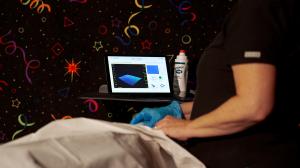Bexa™ Project Expands Breast Cancer Screening Access in Rural Texas
The Bexa™ Project, part of the Access to Breast Health for Texans initiative, is helping close this gap by bringing advanced breast cancer detection technology to medically underserved communities.
“Sometimes in life, we go through trials and tribulations, and we don't understand why,” Tamara Alexander, TTUHSC Laura W. Bush Institute for Women’s Health project manager and breast cancer survivor, said. “But maybe my cancer journey was meant to be so I could be on this side of that mountain and help other women.”
Alexander, along with her team in Abilene, Texas are working to bring the Bexa™ device, a portable and radiation-free elastography tool, directly to women in rural communities. The device, which resembles a computer mouse, uses low-frequency vibrations to detect and map areas in the breasts that may be harder or less elastic than surrounding tissue — a key early indicator of potential breast cancer.
The Bexa™ Project is helping women in rural communities around Abilene access vital early-detection exams at no cost. Many rural women face significant challenges in accessing breast cancer screenings, including long travel distances, time constraints and financial limitations.
Kathy Wood, a Fisher County resident, described her experience with the Bexa™ exam as “fast, easy, nice and warm, no pain,” adding that it only took 15 minutes and was well worth the 10-mile drive.
Alexander emphasized that Bexa™ is not a replacement for mammograms, but rather a complementary tool that encourages women to take control of their breast health. “Bexa™ and this program really do help find suspicious material in women’s breasts at an early stage and can help save lives very easily,” Alexander said.
For those who require further imaging or treatment, the Bexa™ Project also provides resources for follow-up care, including telehealth consultations.
Tadie Nowlin, a Roby resident, shared her gratitude for the exam. “It was nice for her to tell me right away that everything was fine. I did learn that I had some dense breast tissue, and it was nice that this machine can help see more underneath that. I will share that with my PCP, just because I haven't had a mammogram.”
Alexander said the Bexa™ Project is having a monumental impact, offering women not only the peace of mind that comes with early detection but also the resources to continue their care if needed.
“When they leave, just the look of relief on their face and the results as they walk out the door are monumental,” Alexander said. “We’ve put a lot of women’s minds at ease when they’ve left the exam site.”
Abilene area residents can learn more about the Bexa™ Project and find screenings locations across 24 counties served by the Hendrick Hospital system by contacting Alexander at tamara.alexander@ttuhsc.edu or visit https://qr.bexaequityalliance.org/atbhtmembers/.
For statewide information about breast cancer screenings, visit HealthyTexasWomen.org.
-30-
Suzanna Cisneros
Texas Tech University Health Sciences Center
+1 806-773-4242
email us here
Legal Disclaimer:
EIN Presswire provides this news content "as is" without warranty of any kind. We do not accept any responsibility or liability for the accuracy, content, images, videos, licenses, completeness, legality, or reliability of the information contained in this article. If you have any complaints or copyright issues related to this article, kindly contact the author above.
Neurothrombectomy Device Market is Poised to Growth USD 4.0 Billion by 2035 with Thriving CAGR of 6.32%
Smoke Ingredients for Food Market Projects the market to cross USD 2.72 Billion by 2032, at a CAGR of 4.10% 2025 to 2032
Automotive AC Valves Market to Reach $4.6 billion, Globally, by 2034 at 5.6% CAGR: Allied Market Research
Więcej ważnych informacji
 Jedynka Newserii
Jedynka Newserii

 Jedynka Newserii
Jedynka Newserii

Ochrona środowiska

A. Bryłka (Konfederacja): Ograniczenie emisyjności nie musi się odbywać za pomocą celów klimatycznych. Są absurdalne, nierealne i niszczące europejską gospodarkę
W lipcu br. Komisja Europejska ogłosiła propozycję nowego celu klimatycznego, który zakłada ograniczenie emisji gazów cieplarnianych o 90 proc. do 2040 roku w porównaniu do stanu z 1990 roku. Został on zaproponowany bez zgody państw członkowskich, w przeciwieństwie do poprzednich celów na 2030 i 2050 rok. Polscy europarlamentarzyści uważają ochronę środowiska i zmiany w jej zakresie za potrzebne, jednak nie powinny się odbywać za pomocą nieosiągalnych celów klimatycznych.
Polityka
Dramatyczna sytuacja ludności w Strefie Gazy. Pilnie potrzebna dobrze zorganizowana pomoc humanitarna

Według danych organizacji Nutrition Cluster w Strefie Gazy w lipcu br. u prawie 12 tys. dzieci poniżej piątego roku życia stwierdzono ostre niedożywienie. To najwyższa miesięczna liczba odnotowana do tej pory. Mimo zniesienia całkowitej blokady Strefy Gazy sytuacja w dalszym ciągu jest dramatyczna, a z każdym dniem się pogarsza. Przedstawiciele Polskiej Akcji Humanitarnej uważają, że potrzebna jest natychmiastowa pomoc, która musi być dostosowana do aktualnych potrzeb poszkodowanych i wsparta przez stronę izraelską.
Polityka
Wśród Polaków rośnie zainteresowanie produktami emerytalnymi. Coraz chętniej wpłacają oszczędności na konta IKE i IKZE

Wzrosła liczba osób, które oszczędzają na cele emerytalne, jak również wartość zgromadzonych środków. Liczba uczestników systemu emerytalnego wyniosła w 2024 roku ponad 20,8 mln osób, a wartość aktywów – 307,5 mld zł – wynika z najnowszych danych Urzędu Komisji Nadzoru Finansowego (UKNF). Wyraźny wzrost odnotowano w przypadku rachunków IKE i IKZE, na których korzyść działają m.in. zachęty podatkowe. Wpłacane na nie oszczędności są inwestowane, a tym samym wspierają gospodarkę i mogą przynosić atrakcyjną stopę zwrotu.
Partner serwisu
Szkolenia

Akademia Newserii
Akademia Newserii to projekt, w ramach którego najlepsi polscy dziennikarze biznesowi, giełdowi oraz lifestylowi, a także szkoleniowcy z wieloletnim doświadczeniem dzielą się swoją wiedzą nt. pracy z mediami.








.gif)

 |
| |
| |
|